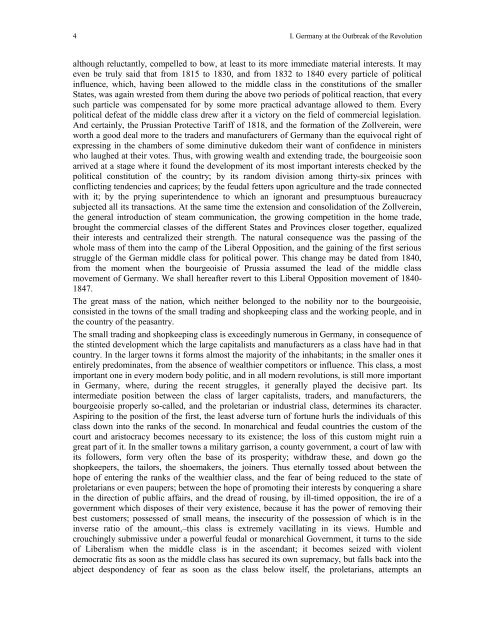Revolution and Counter Revolution in Germany - Marxists Internet ...
Revolution and Counter Revolution in Germany - Marxists Internet ...
Revolution and Counter Revolution in Germany - Marxists Internet ...
You also want an ePaper? Increase the reach of your titles
YUMPU automatically turns print PDFs into web optimized ePapers that Google loves.
4 I. <strong>Germany</strong> at the Outbreak of the <strong>Revolution</strong><br />
although reluctantly, compelled to bow, at least to its more immediate material <strong>in</strong>terests. It may<br />
even be truly said that from 1815 to 1830, <strong>and</strong> from 1832 to 1840 every particle of political<br />
<strong>in</strong>fluence, which, hav<strong>in</strong>g been allowed to the middle class <strong>in</strong> the constitutions of the smaller<br />
States, was aga<strong>in</strong> wrested from them dur<strong>in</strong>g the above two periods of political reaction, that every<br />
such particle was compensated for by some more practical advantage allowed to them. Every<br />
political defeat of the middle class drew after it a victory on the field of commercial legislation.<br />
And certa<strong>in</strong>ly, the Prussian Protective Tariff of 1818, <strong>and</strong> the formation of the Zollvere<strong>in</strong>, were<br />
worth a good deal more to the traders <strong>and</strong> manufacturers of <strong>Germany</strong> than the equivocal right of<br />
express<strong>in</strong>g <strong>in</strong> the chambers of some dim<strong>in</strong>utive dukedom their want of confidence <strong>in</strong> m<strong>in</strong>isters<br />
who laughed at their votes. Thus, with grow<strong>in</strong>g wealth <strong>and</strong> extend<strong>in</strong>g trade, the bourgeoisie soon<br />
arrived at a stage where it found the development of its most important <strong>in</strong>terests checked by the<br />
political constitution of the country; by its r<strong>and</strong>om division among thirty-six pr<strong>in</strong>ces with<br />
conflict<strong>in</strong>g tendencies <strong>and</strong> caprices; by the feudal fetters upon agriculture <strong>and</strong> the trade connected<br />
with it; by the pry<strong>in</strong>g super<strong>in</strong>tendence to which an ignorant <strong>and</strong> presumptuous bureaucracy<br />
subjected all its transactions. At the same time the extension <strong>and</strong> consolidation of the Zollvere<strong>in</strong>,<br />
the general <strong>in</strong>troduction of steam communication, the grow<strong>in</strong>g competition <strong>in</strong> the home trade,<br />
brought the commercial classes of the different States <strong>and</strong> Prov<strong>in</strong>ces closer together, equalized<br />
their <strong>in</strong>terests <strong>and</strong> centralized their strength. The natural consequence was the pass<strong>in</strong>g of the<br />
whole mass of them <strong>in</strong>to the camp of the Liberal Opposition, <strong>and</strong> the ga<strong>in</strong><strong>in</strong>g of the first serious<br />
struggle of the German middle class for political power. This change may be dated from 1840,<br />
from the moment when the bourgeoisie of Prussia assumed the lead of the middle class<br />
movement of <strong>Germany</strong>. We shall hereafter revert to this Liberal Opposition movement of 1840-<br />
1847.<br />
The great mass of the nation, which neither belonged to the nobility nor to the bourgeoisie,<br />
consisted <strong>in</strong> the towns of the small trad<strong>in</strong>g <strong>and</strong> shopkeep<strong>in</strong>g class <strong>and</strong> the work<strong>in</strong>g people, <strong>and</strong> <strong>in</strong><br />
the country of the peasantry.<br />
The small trad<strong>in</strong>g <strong>and</strong> shopkeep<strong>in</strong>g class is exceed<strong>in</strong>gly numerous <strong>in</strong> <strong>Germany</strong>, <strong>in</strong> consequence of<br />
the st<strong>in</strong>ted development which the large capitalists <strong>and</strong> manufacturers as a class have had <strong>in</strong> that<br />
country. In the larger towns it forms almost the majority of the <strong>in</strong>habitants; <strong>in</strong> the smaller ones it<br />
entirely predom<strong>in</strong>ates, from the absence of wealthier competitors or <strong>in</strong>fluence. This class, a most<br />
important one <strong>in</strong> every modern body politic, <strong>and</strong> <strong>in</strong> all modern revolutions, is still more important<br />
<strong>in</strong> <strong>Germany</strong>, where, dur<strong>in</strong>g the recent struggles, it generally played the decisive part. Its<br />
<strong>in</strong>termediate position between the class of larger capitalists, traders, <strong>and</strong> manufacturers, the<br />
bourgeoisie properly so-called, <strong>and</strong> the proletarian or <strong>in</strong>dustrial class, determ<strong>in</strong>es its character.<br />
Aspir<strong>in</strong>g to the position of the first, the least adverse turn of fortune hurls the <strong>in</strong>dividuals of this<br />
class down <strong>in</strong>to the ranks of the second. In monarchical <strong>and</strong> feudal countries the custom of the<br />
court <strong>and</strong> aristocracy becomes necessary to its existence; the loss of this custom might ru<strong>in</strong> a<br />
great part of it. In the smaller towns a military garrison, a county government, a court of law with<br />
its followers, form very often the base of its prosperity; withdraw these, <strong>and</strong> down go the<br />
shopkeepers, the tailors, the shoemakers, the jo<strong>in</strong>ers. Thus eternally tossed about between the<br />
hope of enter<strong>in</strong>g the ranks of the wealthier class, <strong>and</strong> the fear of be<strong>in</strong>g reduced to the state of<br />
proletarians or even paupers; between the hope of promot<strong>in</strong>g their <strong>in</strong>terests by conquer<strong>in</strong>g a share<br />
<strong>in</strong> the direction of public affairs, <strong>and</strong> the dread of rous<strong>in</strong>g, by ill-timed opposition, the ire of a<br />
government which disposes of their very existence, because it has the power of remov<strong>in</strong>g their<br />
best customers; possessed of small means, the <strong>in</strong>security of the possession of which is <strong>in</strong> the<br />
<strong>in</strong>verse ratio of the amount,–this class is extremely vacillat<strong>in</strong>g <strong>in</strong> its views. Humble <strong>and</strong><br />
crouch<strong>in</strong>gly submissive under a powerful feudal or monarchical Government, it turns to the side<br />
of Liberalism when the middle class is <strong>in</strong> the ascendant; it becomes seized with violent<br />
democratic fits as soon as the middle class has secured its own supremacy, but falls back <strong>in</strong>to the<br />
abject despondency of fear as soon as the class below itself, the proletarians, attempts an















![tyf Enf=O=n]lgg](https://img.yumpu.com/47584932/1/190x245/tyf-enfonlgg.jpg?quality=85)

